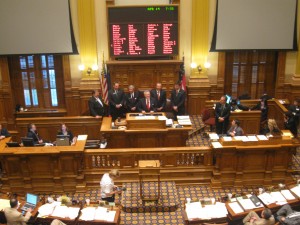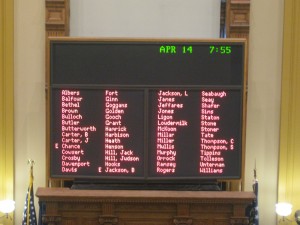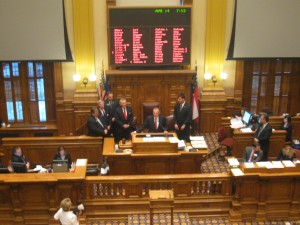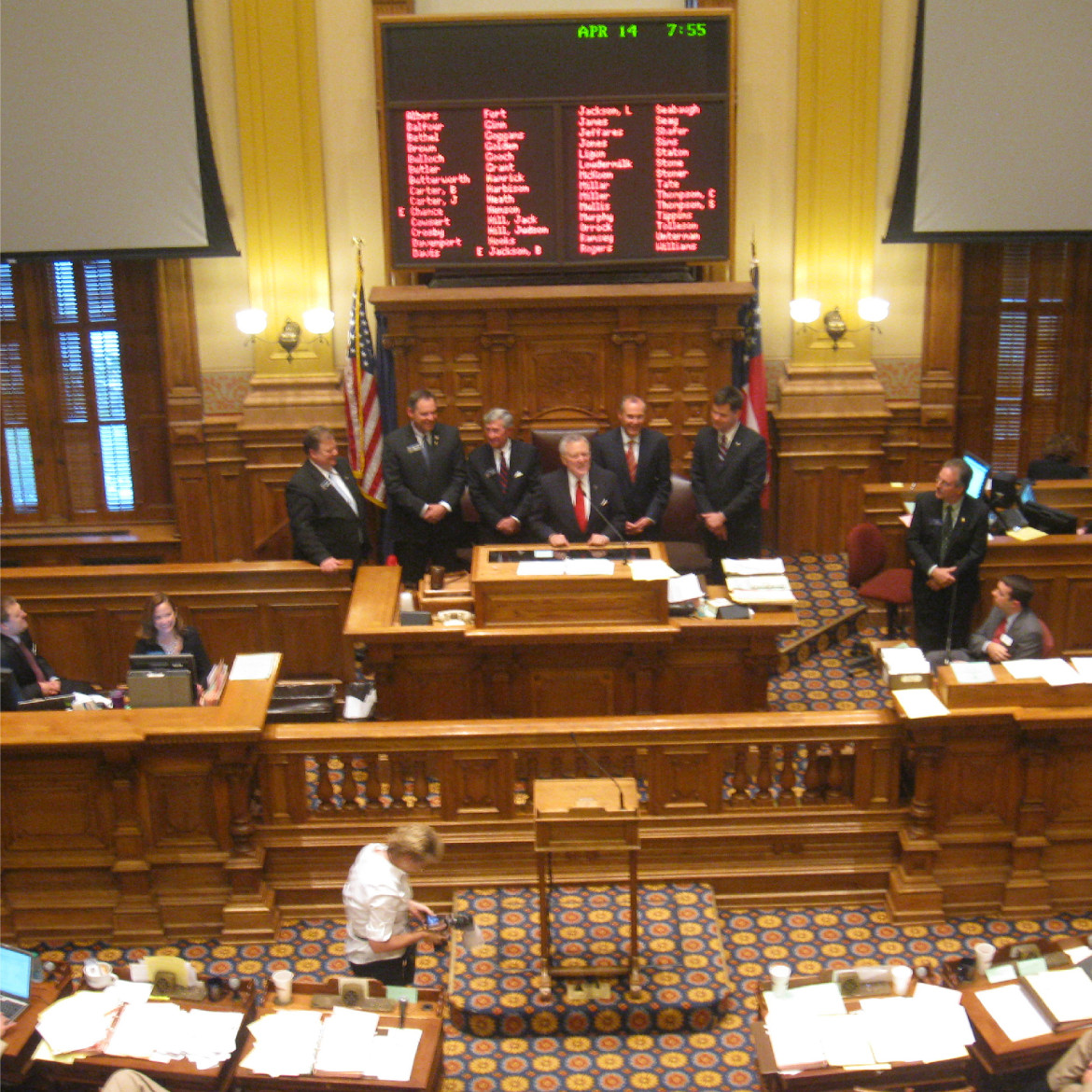
Governor Deal addresses the State Senate on the last day of the 2011 session.
When Rep. Tom Weldon (R-Ringgold) passed Barton Child Law and Policy Center Policy Director Kirsten Widner in a crowded hallway in the state capitol Thursday evening, he couldn’t resist passing on kudos. “You’ve had a good day,” he said, leaning in with a smile and an outstretched hand. “You’ve had a good day too,” she responded, with a grin and firm shake.
That exchange, in many ways, summed up the reaction many state child advocates and members of the Georgia General Assembly have expressed about the official close of the 2011 legislative session. And it’s not so surprising.
The last full day wrapped up with House Bill 373, also known as the juvenile “
“The Georgia General Assembly made time for children's issues,” said Widner, who spent most of the day with her eyes fixed on the closed-circuit television screens perched near the Senate and House chamber doors respectively. “They took their time with the human trafficking, runaway and DJJ’s (Georgia Department of Juvenile Justice) 'Good Behavior' bills and made some real progress this session.”
Rep. Weldon, still basking in the glow of his afternoon victory, agreed.
“The Georgia Runaway Youth Safety Act moves Georgia law forward and ensures that children who could not get services now have a lot more outlets in the state to obtain help,” he said of SB 94, which would allow runaway shelters to provide emergency housing and services to minors for 72 hours while parental notification is pending. “This authorizes good people to provide services for a forgotten group of children who need help.”
Rep. Weldon said after his version of the Runaway Act, also known as HB 185, failed to make the Crossover Day deadline, its “language” was added into Senator Bill Heath's (R-Bremen) SB 94 gun bill, allowing it to pass in time for the last day.
“He agreed to let us to take out his gun bill language and replace it with ours,” Rep. Weldon explained, referring to the Runaway Act. “So essentially, the bill died in the House but was revived by a sub-committee in the Senate.”
Voices Advocacy Director Polly McKinney expressed mixed emotions about the 2011 session.
“Overall better than usual,” she said, noting the challenges budget cuts posed for lawmakers and state agencies. “We didn’t get all that we wanted passed, but there was a fair amount of discourse with the governor and that’s very helpful. Any session where there’s a lot of fighting over what (funds or programs) has to be cut, you’re going to have a tough time.”

The state capitol bustled with activity on the last day of the 2011 session.
McKinney applauded the “Good Behavior Bill,” calling it “a more holistic approach to child well-being” and “reward-based as opposed to punitive.” She also described the fact that both the House and Senate introduced versions of the Code Rewrite this session as a “major accomplishment” that will allow stakeholders to “work on it together in 2012.”
Although the special session is slated to begin in August, Widner noted that discussions are already underway for plans to host joint hearings on the Code Rewrite -– including both the House and Senate judiciary committee members -– as early as June.
Sen. Emanuel Jones’ (D-Decatur) juvenile parole board bill, which proposed to establish a three-person juvenile parole panel appointed by the DJJ commissioner, did not advance this session. Still overall, he said, some strides were made in the area of juvenile justice in Georgia.
“The important thing about this session is that the governor took an interest in tackling issues regarding our prison population; youth offenders as well as adult offenders,” he said.
Sen. Jones and other child welfare advocates also touted the governor's new bi-partisan initiative aimed at overhauling the state's criminal justice system as another important legislative milestone this session. State legislative leaders, including Supreme Court Justice Carol Hunstein, House Speaker David Ralston (R-Blue Ridge), House Minority Leader Stacey Abrams (D-DeKalb), Attorney General Sam Olens and Lt. Governor Casey Cagle (R-Gainesville) joined the governor in February in announcing plans to assemble a new special council that they will all take part in. The legislation introduced by Rep. Jay Neal (R-LaFayette) calls for a council to study criminal justice reforms and make recommendations to a joint legislative committee no later than Jan. 9, 2012.
“The governor’s commitment to look into SB 440 and SB 441, the laws dealing with mandatory minimums (sentences) for certain serious offenses, is really what this [council] is designed to do,” said Sen. Jones, a Georgia Legislative Black Caucus member. “I would have liked more progress on these issues, including on the juvenile code, but unfortunately sometimes you have to face the political headwinds.”
Sen. Jones’ fellow Black Caucus member Rep. Alisha Thomas Morgan (D-Austell) said she too believes that juvenile justice issues “fared well” in 2011. Her only request was that the governor ensure that diverse representation is a priority on his bi-partisan council.

Lt. Governor Cagle introduces Gov. Deal on the Senate floor.
“People of color are disproportionately represented in the criminal justice system, so I just hope that people of color are included in the process,” she said. “But I am excited about this step and I am hopeful.”
Sen. Vincent Fort (D-Atlanta) wasn’t nearly as optimistic about the session.
“These bills and initiatives are some of the more positive things to come out of the legislature in a long time, but those are just structural things,” he said, in between votes on the Senate floor. “As a state we need to do much more to protect children. We still have hungry children; undereducated children that lack health care. The solutions to those issues lie in making a real investment in children. That’s the only way to prevent those problems.”
He also expressed disappointment over measures that failed to pass.
“We did not raise the school attendance age, we cut funds for K-12 education and to be honest we’re looking at ‘tweaking’ the criminal justice system,” Sen. Fort said of the general assembly as a whole. “At the same time we gave a $26 million tax break to Delta (Airlines) and gave several million dollars to [aerospace and aircraft manufacturing company] Gulfstream. The fact of the matter is that we’ve had more discussion about Sunday liquor sales than investing in our children.”
